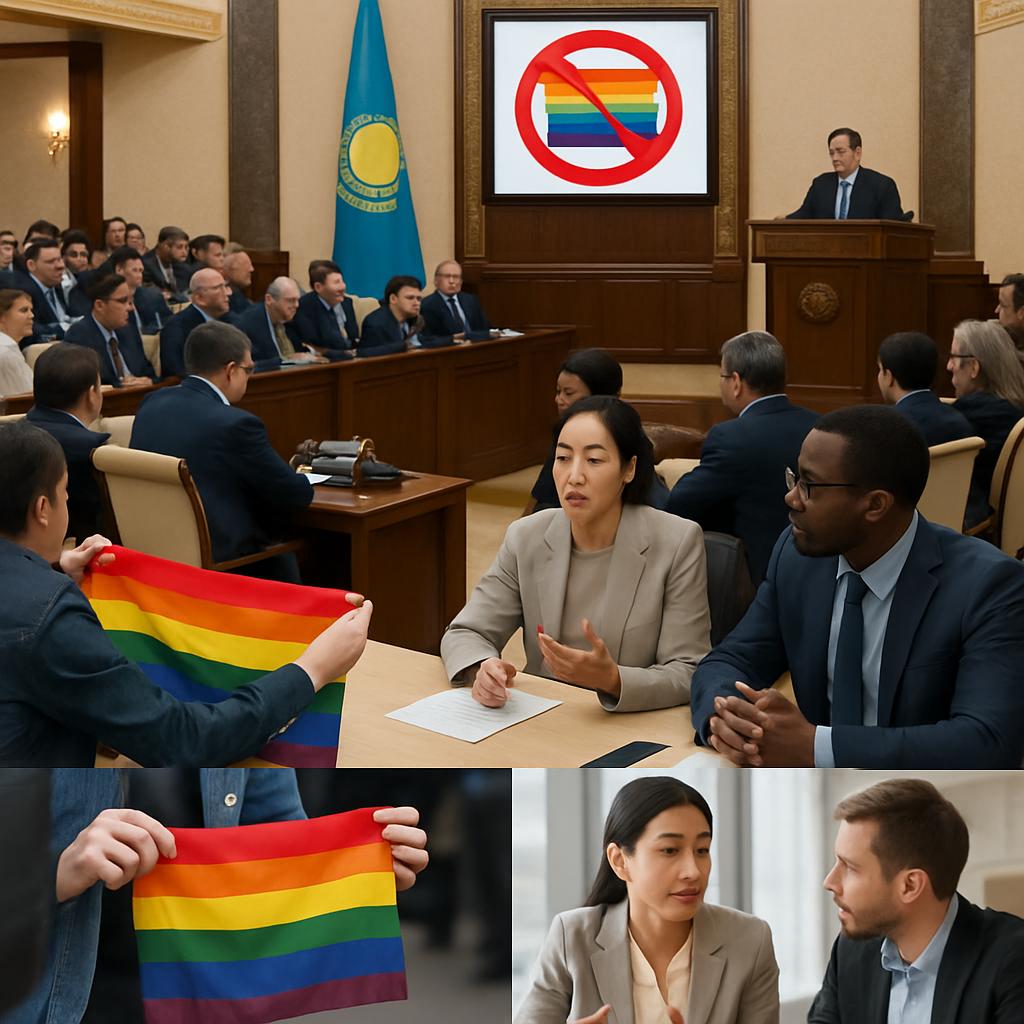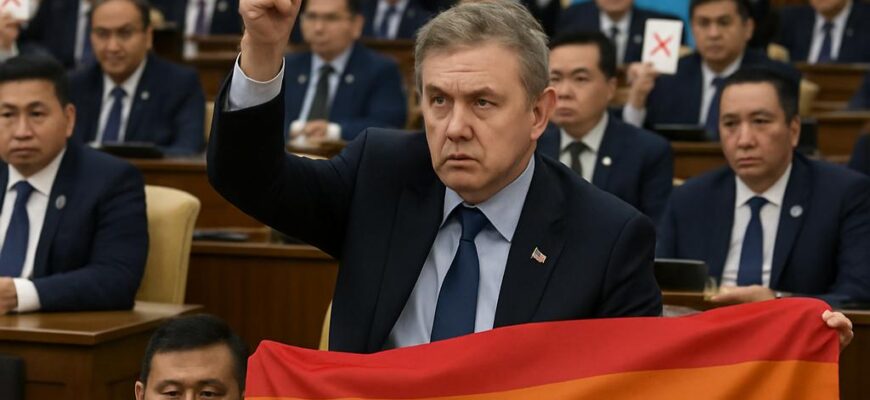The parliament in Nur-Sultan has passed a measure that tightens restrictions on public discussion of sexual orientation and gender identity, a move that has drawn swift domestic and international attention. Few developments in recent years have so quickly crystallized tensions between conservative social currents and the human rights community. The vote has already begun to reshape conversations about media, education, and civic life across the country.
- What the vote changes and how the law reads
- Political backdrop: why the bill moved forward now
- Domestic reactions: civil society, media, and everyday voices
- International response and diplomatic implications
- How this compares with similar laws abroad
- Practical implications for media, education, and NGOs
- Human cost: lives folded into policy
- Legal avenues and advocacy strategies
- Paths forward: what stakeholders can do
- What to watch next
What the vote changes and how the law reads
Lawmakers approved language broadly framed as a ban on “propaganda” aimed at minors, covering public statements, media content, and online materials that portray non-heteronormative relationships in a positive or neutral light. Ambiguities in the text mean officials will likely have wide latitude to interpret what constitutes prohibited material, from classroom discussion to social media posts.
Penalties are reportedly a mix of fines and administrative measures against institutions, though enforcement mechanisms remain to be clarified. In practice, such laws often translate into increased surveillance of NGOs, restrictions on public events, and pressure on publishers and broadcasters to self-censor.
Observers note the measure’s phrasing echoes similar laws elsewhere, which explicitly target any representation that could be deemed to “promote” LGBT identities to young audiences. The vagueness of terminology — what counts as promotion versus information — is a central concern for rights advocates.
Political backdrop: why the bill moved forward now
The vote comes at a moment of political recalibration, when legislators across several countries are advancing socially conservative bills as part of broader efforts to appeal to traditionalist constituencies. In Kazakhstan, as in many states, social policy has become a stage on which political identity and values are performed.
Fragments of public opinion are divided: some citizens and religious groups express support for protecting children from what they describe as “confusing” messages, while others argue the law infringes on basic freedoms. For lawmakers, the calculus may be as much about signaling — to voters and to power brokers — as it is about concrete outcomes.
Whether the passage represents a tightening of state control or a symbolic gesture depends on enforcement and the response of courts, the press, and civil society. Either way, the law will shape everyday life for many people, and it will test the resilience of institutions that mediate between citizens and the state.
Domestic reactions: civil society, media, and everyday voices
Human rights organizations inside Kazakhstan sounded alarms almost immediately, warning that the law will stigmatize LGBT people and curtail the work of advocacy groups. Journalists and independent media outlets are weighing how to report responsibly without risking legal repercussions.
At the same time, some community leaders and religious figures have publicly applauded the move as protective and moral. That vocal support helps explain the bill’s momentum in parliament, but it also deepens polarization, leaving LGBT people more exposed to harassment and social exclusion.
From my own reporting in the region, I’ve seen how a single legal change can ripple into everyday interactions: health services become harder to access, teachers avoid certain topics, and families feel extra pressure. These are not abstract consequences — they translate into quieter, cumulative harms.
International response and diplomatic implications
Human rights organizations and several Western governments have criticized the measure, describing it as a setback for free expression and equality. International bodies typically urge governments to craft laws that protect children without undermining the rights of minority groups, and this vote sparked precisely that conversation.
Diplomatic pushback may be limited to statements and appeals initially, but ongoing enforcement could provoke tougher responses, such as reduced cultural cooperation or conditional aspects of aid and trade engagements. Countries often balance strategic interests with human rights concerns, making each reaction a diplomatic calculation.
At the same time, Kazakhstan will likely point to national sovereignty and cultural norms when responding to criticism. That framing tends to resonate domestically and complicates the work of international advocates seeking immediate policy reversals.
How this compares with similar laws abroad
0
Comparable laws in the region and beyond provide useful precedents for what might follow in Kazakhstan. Russia’s 2013 federal ban on “gay propaganda” and Hungary’s 2021 restrictions on LGBT content for minors have both led to tightened censorship and increased marginalization of LGBT communities.
These cases suggest that even without draconian penalties, laws of this type create a chilling effect. Artists, educators, and activists often preemptively avoid topics that could attract scrutiny, leading to a narrower public discourse and reduced civic space.
| Country | Year | Effect |
|---|---|---|
| Russia | 2013 | Wider censorship of LGBT-positive materials and restrictions on public events |
| Hungary | 2021 | Bans on LGBT content in media and education aimed at minors |
| Kazakhstan | recent | New restrictions framed as protection of youth; enforcement pending |
Practical implications for media, education, and NGOs
Editors and producers may shift away from topics that could be interpreted as endorsing non-traditional identities, narrowing the scope of public debate. Teachers and school administrators face a particularly fraught position: explaining human diversity without crossing legal red lines could become nearly impossible in classrooms.
NGOs that support sexual health, provide counseling, or work on anti-violence initiatives might find their operations constrained. Donors and partner organizations will have to reassess how they deliver services without triggering accusations of prohibited advocacy.
In my professional experience, organizations that pivot quickly toward neutral, evidence-based language and that document their activities carefully tend to preserve some operating space. Yet the threat of arbitrary enforcement remains a persistent stress on program delivery.
Human cost: lives folded into policy
For LGBT individuals, the law is not just a headline — it reshapes daily risk calculations. People may avoid public identification, skip testing or care, and withdraw from visible communities that once offered support. That isolation compounds mental health challenges and exposes people to greater vulnerability.
Families and employers also face new dilemmas. Employers might distance themselves from inclusive workplace policies to avoid controversy, and family members may be encouraged by social pressures to insist on conformity rather than support. These micro-level shifts can dramatically reduce life options and personal safety.
Stories from neighbors and friends — the quiet exits from social life, the change in tone at community gatherings — reveal how quickly policy filters down into ordinary interactions. It’s a pattern I’ve observed whenever legislation stigmatizes a group rather than protects rights.
Legal avenues and advocacy strategies
Challenging the law in domestic courts will be one avenue for opponents, though success depends on judicial independence and constitutional protections. Strategic litigation often focuses on narrow, provable harms and on procedural flaws to gain traction.
Advocates also use international mechanisms, submitting reports to UN bodies and engaging with regional human rights institutions to apply moral and legal pressure. Simultaneously, grassroots organizing — mutual aid, confidentiality networks for those at risk, and discreet counseling services — can mitigate immediate harms on the ground.
Practical advice for civil society includes maintaining meticulous records, seeking international partnerships, and prioritizing community safety when planning public campaigns. These are the pragmatic steps that save lives while longer-term political fights continue.
Paths forward: what stakeholders can do

Policymakers who wish to address concerns about child welfare can do so without blanket bans that suppress whole categories of information. Clear, narrowly tailored age-appropriate guidelines and support for parental education programs are alternative approaches that avoid criminalizing speech.
International actors can support local organizations with emergency funding, legal aid, and diplomatic engagement that emphasizes constructive dialogue over punitive measures. Media literacy initiatives and discreet community resources can help families access reliable information without escalating conflict.
For ordinary citizens who care about pluralism, small acts matter: supporting independent journalism, amplifying marginalized voices, and participating in civic forums can slowly rebuild spaces for reasoned debate. Change rarely happens overnight, but persistent civic engagement shapes long-term outcomes.
What to watch next
Key indicators of how the law will affect life in Kazakhstan include the first enforcement actions, court challenges, and responses from major media outlets. Each will signal whether the law becomes a blunt instrument or remains largely symbolic.
Watch also for shifts in NGO registration rules or additional proposals that build on this rhetoric; legislative momentum often comes in waves. The way educational institutions adapt their curricula will be another telling sign of the law’s practical reach.
Documenting these developments is essential. Independent reporting and careful, evidence-based monitoring will allow citizens and the international community to assess the real-world impact as it unfolds.
If you want more in-depth analysis and ongoing coverage of developments like this, visit https://themors.com/ and explore the site’s other materials. Your engagement helps keep these conversations alive and supports the work of reporters and advocates on the ground.









